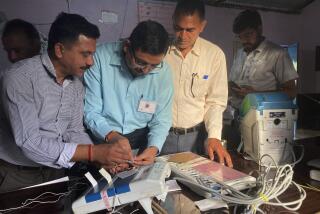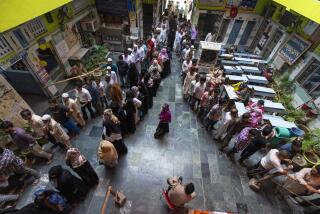Test for a Nervous India
- Share via
India has a welter of religions, from Hinduism and Islam to Buddhism and Jainism. Sikhs and Christians fill out the landscape. If at times there have been tensions between practitioners of differing beliefs--and sometimes outbreaks of appalling violence--the country rightly has prided itself on being officially secular, protecting everyone.
So last week’s election results in the nation of nearly 1 billion people have caused proper concern. The Bharatiya Janata Party, dominated by Hindu nationalists, won the most seats in Parliament. If the party succeeds in forming a lasting government, its leaders need to shun the rhetoric of its more militant members, whose proclamations of Hindu supremacy have frightened and angered adherents of other religions, especially Muslims.
The balloting for more than 500 seats in the lower house of Parliament did have the salutary effect of putting politicians of all parties on notice that voters are fed up. Hindu nationalists were turned out of power in states of western India. The Congress Party, the main rival to the BJP and ruler of India for nearly all the nation’s 50 years of independence, lost seats in other states.
Some Indian journalists found voters were more concerned with their local and state governments than with the doings in New Delhi, the national capital. One cited “clean water and air and jobs” as the main worries.
Government after government in India has promised to develop the country, lift citizens out of poverty and bring electricity and unpolluted drinking water to the villages, where most of the population lives. Too often the promises have been empty. The village of an important politician might get a new well; other villages did without.
In the brief interludes of rule by parties other than the Congress, governments dithered. Their uniting principle commonly was opposition to the Congress Party, not national goals. They worked mightily to gain power; once they had won it, they seemed unsure what to do with it.
Most of the men and women who fought for independence from Britain, who walked with Mohandas Gandhi through the heat and dust of rural hamlets, are gone now. Whether their descendants have the same commitment to a secular India that protects minority rights will be an important test of a new government. So will turning away from the corruption that has plagued too many regimes in India for too many years.
More to Read
Sign up for Essential California
The most important California stories and recommendations in your inbox every morning.
You may occasionally receive promotional content from the Los Angeles Times.













